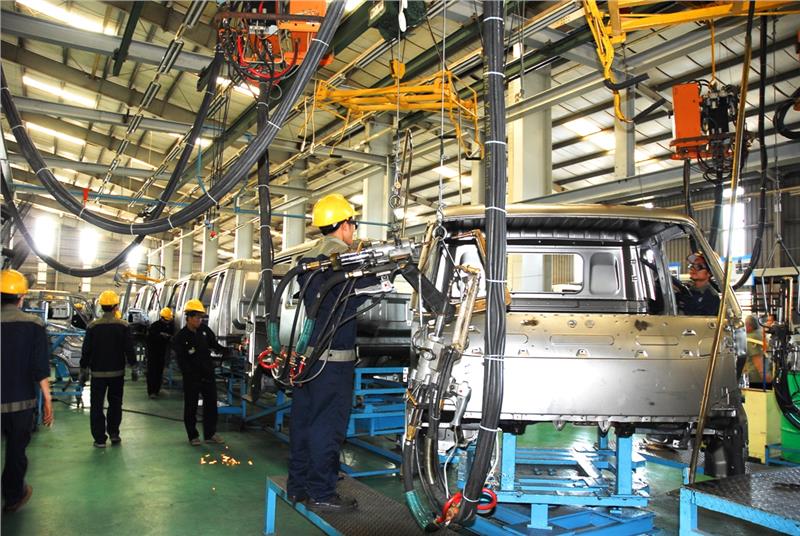The Prime Minister Nguyen Tan Dung has signed a decision approving the development plan of automotive industry of Vietnam to 2020, vision to 2030 with the aim of developing the automotive industry as an important industry of the country. The aim of the automotive industry is going to meet the maximum demand of the domestic market for vans, buses and some common specialized vehicles; to become a provider of spare parts, accessories and some detail sets having the high value in the automotive production chain of the world.
The plan approved by the Prime Minister has outlined several specific figures on the proportion, the number of vehicles manufactured and assembled in the country compared to the total domestic demand, expected vehicle production; expected export production finished of vehicles and parts. Regarding the expected proportion of the number of vehicles manufactured or assembled in the country compared to the total domestic demand, in particular, the 9-seat cars will account for 60% in 2020, 65% in 2025 and 70% in 2030. The cars having more than 10 seats will account for 90% in 2020 and 92% in 2030. The vans will account for 78% in 2020 and 80% in 2030. The specialized vehicles will account for 15% in 2020 and 20% in 2030.

In addition, the expected vehicle production in 2020 will reach 227.000 units; in 2025 will be more than 466.000 units and in 2030 will reach nearly 863.000 units (including 452.000 cars below 9 seats and more than 356.000 vans). The number of finished vehicles and parts for export is expected to export 20.000 units in 2020 and 30.000 units in 2030. Exports of components and spare parts reach $ 4 billion in 2020 and $ 6 billion in 2030. Up to 2020, the industry support for manufacturing vehicles will be essentially formed. Striving to meet 30-40% (in value) demand of components, spare parts in the production and assembly of cars in the country, gradually participating in the supply system components and spare parts of the global value chain of the world automotive industry. By the period from 2012-2025, the support industry continues developing to meet 40-45% the demand of the market, in the period from 2026-2030 ensures to supply more than 50% (in value) the demand in the domestic market, thrives to become an important provider of some components and spare parts for the automotive industry in the region and the world.
In terms of policy and measures, the oriented scheme applies the highest incentives for projects producing environmentally friendly vehicles. The domestic enterprises participating in the global supply chain in manufacturing, exporting components, spare parts and finished vehicles are applied steady export credit policy; enjoyed the preferential regime of the National Trade Promotion Program, favored under the key mechanical program; project manufacturing automotive components and spare parts is loaned with the low-interest state.

For the consumer sector, the scheme requires to review and adjust the tax policy and cost towards facilitating development of the automotive industry to meet the needs of automobile use of the economy and the people along with the synchronous development of transport infrastructure and environmental protection requirements.
According to the scheme, the mid-range and short range passenger cars from 16 to 24 seats will be applied the lowest tax rate, environmentally friendly vehicles will be applied the preferential and passenger vehicles having 9 seats, with a capacity of 3.0-liter engine will be applied the highest tax rate and issued the high environmental cost for them. The scheme requires consistent implementation of policy system will be issued in minimum 10-year period, consistent with the trend of integration and give confidence to investors and manufacturers
